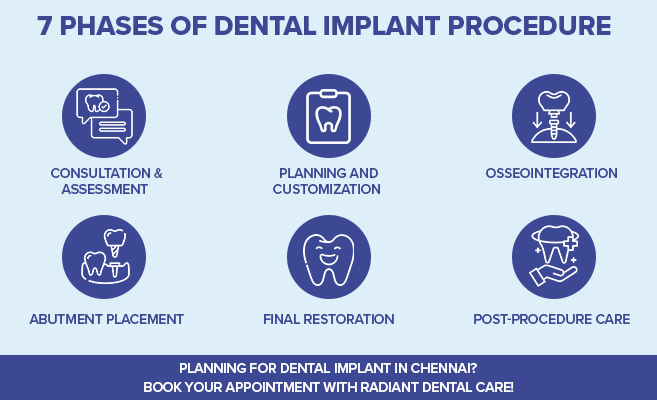What Are the Phases of Dental Implant Procedure?

Dental implants have revolutionized tooth replacement, offering durability, natural aesthetics, and improved oral health. But if you’re exploring the phases of dental implant procedure, you already know what dental implants are and why they matter. Now, it’s time to understand the step-by-step process, what to expect, potential challenges, and how expert care can make all the difference.
At Radiant Dental Care, recognized as one of the best dental implant clinic in Chennai, we prioritize precision and patient comfort through every phase. This guide will walk you through each critical phase of the implant journey, from consultation to maintenance, so you’re fully prepared and confident about what lies ahead.

Understanding the Dental Implants Journey: Why Knowing the Phases Matters
Understanding the journey and the phases of dental implant procedure is essential because dental implant treatment is more than just a single surgery. It’s a carefully orchestrated process involving multiple steps that must be done in sequence to ensure success and longevity.
- Ensuring optimal implant placement
- Promoting proper healing and integration
- Delivering a natural, functional final tooth
Getting familiar with these phases helps you stay engaged and empowered throughout your implant journey.
Phase 1: Initial Consultation and Comprehensive Assessment
Before any procedure begins, a thorough evaluation is essential. This phase sets the foundation for success.
What happens:
- Detailed medical and dental history review.
- Clinical examination of gums, jawbone, and existing teeth.
- Advanced imaging such as 3D CBCT scans to assess bone density and anatomy.
- Discussion of patient goals, expectations, and any concerns.
Why it matters:
The success of implants depends heavily on the condition of your jawbone and oral health. Identifying bone deficiencies, infections, or medical conditions upfront allows the team at Radiant Dental Care to tailor the treatment plan precisely.
Challenges addressed:
- Patients with insufficient bone may require bone grafting.
- Detecting gum disease early to prevent complications.
- Aligning patient expectations realistically.
Phase 2: Treatment Planning and Customized Approach
Once the initial assessment is complete, your dental surgeon crafts a personalized plan.
Key components:
- Choosing implant type and size based on anatomical needs.
- Scheduling any preparatory procedures (bone grafts, sinus lifts).
- Explaining the timeline and phases to you in detail.
- Pre-operative instructions including medications and lifestyle adjustments.
Radiant Dental Care’s advantage:
Using cutting-edge planning software, Radiant Dental Care ensures precision placement, minimizing surgical risks and optimizing aesthetics and function.
Phase 3: Surgical Implant Placement
This is the pivotal step where the implant post is surgically anchored into the jawbone.
What to expect:
- Local anesthesia or sedation for patient comfort.
- Precise drilling to create a socket for the implant.
- Placement of the titanium implant post.
- Suturing and post-operative care instructions.
Critical factors:
- Surgical technique impacts healing time and implant stability.
- Maintaining a sterile environment reduces infection risk.
- Patient cooperation with post-surgery care is vital.
Managing challenges:
- Possible swelling, minor pain, or bruising are common but manageable.
- Radiant Dental Care’s experienced surgeons use minimally invasive techniques to reduce discomfort and speed healing.
Phase 4: Osseointegration, The Healing Phase
Following surgery, the implant must integrate with the jawbone in a process called osseointegration.
Timeline:
- Typically lasts 3 to 6 months.
- During this phase, the bone grows tightly around the implant, anchoring it firmly.
Patient guidance:
- Maintain oral hygiene but avoid disturbing the surgical site.
- Follow diet recommendations to avoid hard or sticky foods.
- Attend regular check-ups to monitor healing progress.
Potential risks and solutions:
- Implant failure risk is low but possible with poor healing or infection.
- Radiant Dental Care monitors closely and intervenes promptly if issues arise.
Phase 5: Abutment Placement, Connecting the Implant to the Crown
Once osseointegration is confirmed, the abutment is attached to the implant.
Details:
- Minor surgical procedure to expose the implant.
- Placement of the abutment, which connects the implant to the crown.
- Temporary healing caps may be used to shape gums properly.
What patients should know:
- Slight discomfort may occur but is generally mild.
- Healing time for gums around the abutment is usually 2 weeks.
Phase 6: Final Restoration, Crown Placement
The final phase where your new tooth becomes functional and natural-looking.
Process:
- Impressions of your teeth and abutment are taken for custom crown fabrication.
- Radiant Dental Care’s dental lab ensures the crown matches shape, size, and color.
- The permanent crown is securely fixed to the abutment.
Outcomes:
- Fully functional, natural-appearing tooth.
- Restored chewing ability and smile aesthetics.
Phase 7: Post-Procedure Care and Long-Term Maintenance
The implant journey doesn’t end with crown placement. Ongoing care is crucial.
Best practices:
- Maintain excellent oral hygiene with brushing, flossing, and periodic professional cleanings.
- Avoid habits harmful to implants, such as smoking or excessive grinding.
- Schedule regular follow-ups to monitor implant health.
Radiant Dental Care’s commitment:
Learn about our dental warranty program for peace of mind. We stand behind our quality treatments and provide long-term coverage.
Additional Insights: Factors That Influence Each Phase
Bone Quality and Quantity
A strong bone foundation accelerates healing and implant stability. If bone is insufficient, grafting or sinus lift procedures might be required, adding complexity and time to your treatment.
Patient Health and Lifestyle
Conditions like diabetes or smoking can affect healing and implant success. Managing these risks through pre-treatment counseling and post-op care is essential.
Technological Advances
Digital scanning and guided implant surgery are game changers, increasing accuracy and reducing healing time, a standard at Radiant Dental Care, one of the top dental clinic in Chennai.
Ready to Start Your Dental Implant Journey? Here’s What You Need to Know!
Understanding dental implant phases is more than knowing the steps; it’s about precision, care, and patience to restore your smile. Each phase ensures your implant’s success and lasting function.
At Radiant Dental Care, we guide you through every step with expert care, advanced technology, and personalized plans tailored to your unique dental needs.
If missing teeth or discomfort are affecting your life, don’t wait. The sooner you explore your options, the sooner you’ll enjoy a natural, durable smile.
Schedule your personalized consultation at Radiant Dental Care today, your trusted best dental implant clinic in Chennai, for expert answers and a clear path forward.
Frequently Asked Questions:
How long does the entire dental implant procedure take?
Ans. The complete process typically spans 3 to 9 months, depending on factors like bone quality, healing speed, and whether additional procedures like bone grafting are needed. Each phase from consultation to final crown placement, is carefully timed to ensure optimal results.
Is dental implant surgery painful?
Ans. Most patients experience minimal discomfort during the surgical phase. Local anesthesia and sedation options are used to ensure a pain-free procedure. Post-surgery mild swelling or soreness is normal and can be managed with prescribed medication.
What factors affect the success of dental implants?
Ans. Success depends on bone density and quality, overall oral health, lifestyle habits such as smoking, and managing medical conditions like diabetes. Proper planning, precise surgery, and following post-operative care guidelines are crucial for implant longevity.
Can anyone get dental implants, or are there specific eligibility criteria?
Ans. While many people are good candidates, eligibility depends on sufficient jawbone structure and good oral health. A comprehensive assessment at Radiant Dental Care, one of the best dental implant clinics in Chennai, determines the best approach for each individual.
How do I maintain my dental implant after the procedure?
Ans. Maintaining implants involves excellent oral hygiene; regular brushing, flossing, and professional cleanings. Avoiding harmful habits like smoking and scheduling routine dental visits help ensure the implant remains healthy and functional for years.

 +91 9513446186
+91 9513446186
